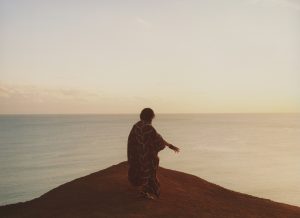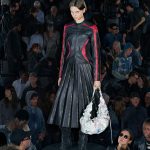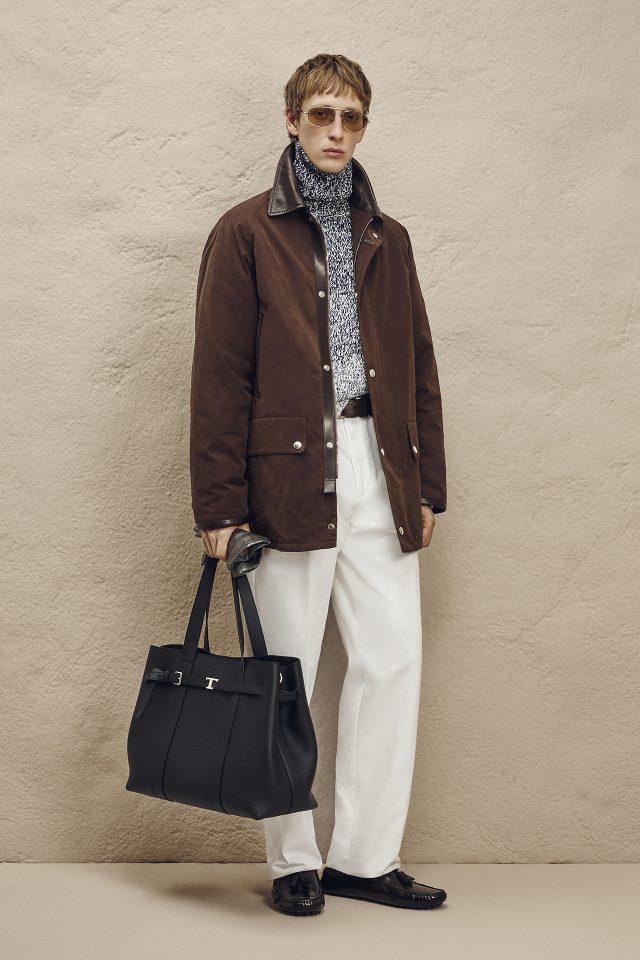A.P.C. (アー・ペー・セー) デザイナー Jean Touitou (ジャン・トゥイトゥ) インタビュー
Photo by UTSUMI
Jean Touitou
創造と破壊−人類が飽きることなく繰り返してきた永遠の摂理。A.P.C.の創設者であり、デザイナーでもある Jean Touitou (ジャン・トゥイトゥ) もまた、創造主であり、破壊者だ。パリジャンの持つオーセンティシティを体現するブランドとしてタイムレスなスタイルを打ち立てながらも、これみよがしで名ばかりな有名ブランドに反旗を翻してきた鬼才は、ブランドを立ち上げてからのこの30年間、何を考え、何を見つめてきたのだろうか。
A.P.C. (アー・ペー・セー) デザイナー Jean Touitou (ジャン・トゥイトゥ) インタビュー
Fashion Design
*You’ll find the English text after the Japanese.

Photo by UTSUMI
創造と破壊−人類が飽きることなく繰り返してきた永遠の摂理。A.P.C.の創設者であり、デザイナーでもある Jean Touitou (ジャン・トゥイトゥ) もまた、創造主であり、破壊者だ。パリジャンの持つオーセンティシティを体現するブランドとしてタイムレスなスタイルを打ち立てながらも、これみよがしで名ばかりな有名ブランドに反旗を翻してきた鬼才は、ブランドを立ち上げてからのこの30年間、何を考え、何を見つめてきたのだろうか。
2017年10月、記念すべき30周年という節目を迎えて、ブランドのDNAを凝縮した渾身の一冊『A.P.C. TRANSMISSION』を発表し、本書の出版にあわせてブランドが日本での初店舗をオープンした所縁の地、代官山でのプレゼンテーションも開催。会場となった T-SITE GARDEN GALLERY でインタビューするべく向かった私たちが目撃したのは、一心不乱に筆を壁に走らせる Jean Touitou の姿だった。「今朝、会場に来て何も飾ってない真っ白な壁が気になったんだ。あの絵どう思う?」好物だというオレンジを頬張りながら、私たちにそんな風に問いかけた彼の顔には、いたずらっ子のようなチャーミングな表情が浮かんでいた。
—30周年おめでとうございます!今回の書籍は、ブランドの始まりから現在までのアーカイヴだけでなく、ブランドの創設前からスタートしていますね。まずは、その頃のお話から聞こうと思います。若い頃に強く影響を受けたものはありますか?ファッション、音楽、哲学、政治、何でも良いです。
哲学だけからインスピレーションをもらってたな。人間は世界をどうしてけばいいのか?進化なのか、それとも革命なのか?
—特定の哲学者からというわけではなく、人類についての根本的な質問について考えていたんですね。
そう!16歳の時、私はこういう考えを持っていたんだ。この世界は大丈夫じゃないから、全てを変えるべきだって。野心的過ぎたのかもしれないね。それで、世界は大丈夫じゃないけれども、世界が完全に崩壊しないためにも行動してみようじゃないかって思ったんだ。それが、本質的な質問だった。ビートルズが「レヴォリューション」を作った時もそうだけれども、”革命か、それとも壊す代わりにもっと良い物を作るのか?”そう若者達は自分に問いかけていたんだ。破壊行為というのは、殺すことだって出来るからね。
—その頃、ヒーローはいましたか?
若い時は、作家のサミュエル・ベケットだけが私のヒーローだった。それだけだね。彼は、人生の不条理について書いていて、そこから非常に美しい作品を作る事が出来たんだ。彼は自分で翻訳することができたし、英語とフランス語のどちらでも最も良い書き方をしていると思ったんだ。フランス語で書いて、それを英語に訳せる数少ない作家のひとりだった。
—いつから絵を描いたり、文章を書き始めたんですか?
あまり書かないんだ。自分の作品のためにテキストを書いたりはするけどね。ファッションは、落ち込むことがないから、好きなんだ。作家か画家だったら、考えすぎてしまうよ。ファッションはアートだけど、現実的でないといけないからね。
—多くのファッションデザイナーは服を作ること、新しいことをするのに苦労しているように思います。あなたはそんなことなさそうですよね?
僕ら(A.P.C.)は、常に新しい物を作ろうとしてるんだよ。そういう風に見えないのは分かってるけど、僕らは同じ事をしないんだ。変化は華々しくないかもしれないが、変化は確かにあるんだ。そうでないと、一日中コレクションを作ったりしないよ。
—以前、『ウォール・ストリート・ジャーナル』のインタビューで「ファッションより音楽の方が好き」と言っていましたよね。
何かを発明しようってわけじゃないから、音楽は私にとって喜びなんだ。分かった、本当の事を言うよ。実は、深刻な失読症を患っているんだ。音楽は、脳を働かすのに良いエキササイズになるから、好きなんだ。歌うためには、右手と左手を調和させる必要があるだろう。それによって脳を整理する事が出来るんだけど、それだけが(音楽を好きな)理由っていうわけじゃないよ。音楽を演奏するっていうのは、ただいい気持ちになれるんだよ。でも、決してビジネスにしようとはしない。アーティスト、ミュージシャンとして自分を押し出したりは絶対しないよ。
—今回の限定発売のTシャツにはあなたのポートレートがプリントされています。これは、あなたがレコードショップを運営していた頃の写真ですよね。
その写真はフォトブースで撮ったんだよ。当時、ニューヨークとパリのどちらに住もうか迷っていたんだ。色んな理由があってね。そんな表情が、そのシャツにプリントされてるんだ。決して面白い表情じゃないよ(笑)レコードショップじゃなくて、通信販売だったんだ。今でいう、eコマースってやつかな。(展覧会の壁を指して)こんなカタログで取引してたんだ。60年代のレア物を持ってたんだけど、小さなオフィスでカタログを打って、レコードを出荷していたんだ。当時は、それしかなかったからレコードなんて呼んでなかったけどね。いくつかは、本当にレア物だったんだよ。ビートルズがアメリカに来日した時の「ブリティッシュ・インヴェイジョン」の後だったね。急に、全都市でビートルズみたいになろうとしたバンドが100組ぐらい出てきて、中にはすごく良いバンドもいたんだ。アメリカの教育では、音楽をたくさん学ぶんだ。例えば、学校でドラムの叩き方を学んだりする。アメリカには良いバンドがたくさんいたんだよ。
—当時はどんな音楽が好きでしたか?
ロックンロールの始まりは、とても興味深かったね。でも、そのあとプロダクションが関わり過ぎてしまったんだ。
—カニエ・ウエストとコラボレーションしましたが、彼の音楽は好きですか?
フランスで、ヒップホップの始まりに僕は携わっていたんだ。ニューヨークに住んでいたからね。アフリカ・バンバーターのズール・ネイションのメンバーと思われてたぐらいだよ。カニエに会った時、僕がヒップホップの始まりから夢中だったという事に彼は感激したんだと思うよ。だから、一緒に話して、ファッションでコラボレーションしたんだ。
—他に最近好きなアーティストはいますか?
トラビス・スコット。彼は、ヒップホップ界のジミー・ヘンドリックスみたいなんだ。とてもありのままなんだよ。パフォーマンス中に走ったり、ステージからオーディエンスにジャンプしたりするんだ。カタルシスなんだ。とても良いアーティストだと思うよ。
—ロックはどうですか?
つまらないかな。良いと思うけど、飽きちゃったよ。
—ヒップホップのほうが面白いってことですか?
いや、ヒップホップもつまらない(笑)彼らは金,車、女の話しかしないんだ。音が良くても、少し時間が経ったら、こんな風に思っちゃうんだ。これはカルチャーじゃないって。限界がありすぎるんだ。だから、カニエの歌詞が好きなんだよ。もっと難解で、面白いんだ。
—確かに、ヒップホップの語ることは A.P.C. の DNA の真逆ですね。
始まった頃は、ヒップホップっていうのはすごくパワフルなカルチャーだったと思う。ロックンロールみたいだったね。でも、それがコマーシャル化されてしまったんだ。ヒップホップが始まった77年頃のことをよく覚えてるよ。面白い事に、パンクとヒップホップは同じ時期に始まったんだ。信じられないかもしれないけど、当時ニューヨークではお互いに交流があったんだ。今では「僕らは同じ宗教じゃない。違うスタイルだし。」って感じだけどね。でもその最初、70年代半ば頃は、どちらも違う形で自己表現していただけでカウンターカルチャーだったんだ。良い例は、ブロンディーだね。ブロンディーは他のバンドと違って、本物のミュージシャンだったんだ。彼らは色んな種類の曲を作ることが出来る。「ラプチャー(Rapture)」っていう曲があるんだけど、これは(ラップをかけた)ダジャレなんだよ。A.P.C. が真逆っていうのは、面白いね。A.P.C. もヒップホップもラジカルな表現を持っていると思う。実際、たくさんのヒップホップのアーティストが店に来るよ。
—A.P.C. の服には確かに反抗的な要素もありますよね。
そうなんだよ。見ればわかると思うけど、マジョリティと同じ行動はしないんだ。同じ事もしない。A.P.C.の香水を見たことないでしょ?この業界では、一度成功するとアイウェアやフレグランス、化粧品、ホームウェアなんかをやれなんて言われたりするんだけど、僕らはそんなことしないんだ。
—現代の若者についてはどう思いますか?また、もしあるとするならば、カウンターカルチャーについては?
今、我々は大きな問題を抱えている。現代のユースカルチャーで最も影響力を持っているのは、セレブ。これが、問題なんだよ。
—SNSは原因の一つでしょうか?
SNSは好きだし、僕自身も使ってるよ、ツイッターは、もう使ってないけどね。ツイッターは、自分と同じ考えを持つ人に向けて自己表現をしたい人達のためのものだ。あるグループと同じ考え方をしなかったら、そのグループに嫌われちゃうんだ。読むことさえ出来ないアイロニーを持ちあわせていない人も中にはいるんだ。動物みたいにね(笑)動物は、アイロニーや白と黒の間の様々な色を理解出来ないからね。ツイッターは白・黒、イエス・ノーといった思考があり過ぎるんだ。そのうち、デジタルカルチャーは全般的なカルチャーさえも殺してしまうかもしれない。良い部分だけキープするべきなんだ。インスタグラムは好きだよ。友達に自分の居場所を教えられるし、彼らの僕の居場所が分かるからね。最近は、広告があり過ぎるけどね。A.P.C.でもしてるけど、しつこすぎない方法でやってるんだ。僕らは(日本語で)「ちょっと」だけしつこい。「ちょっと」だけプッシュするっていうアイディアは好きだよ。
—確かにSNSには良い面もありますよね。個人が自己を表現することが簡単になりました。あなたは個性についてどう思いますか?
なんて、深い質問なんだ。「個性」では無いものを教える事は出来るんだけどね。今の時代、個性は表面的に見え過ぎるんだよ。個性というのは、見えない生活にあるものなんだ。人々はそうした生活を服を通して見せたがる、これが問題なんだよ。個性というのは、とてもプライベートな物だと思うな。
—ちょうどこの前、フランスと日本では個性に対する考え方が違うという話をしていました。例えば日本では、人が服を着るのではなく、服に着られてしまうことがあります。なので、さっきの個性の話には共感してしまいました。
ファッションでは、人が服に着られていることが多すぎるんだ。だから、売れるんだよね。人は、外の世界から自分を守るための武器として(ファッションを)使うんだ。
—「日本の美」についてはどう思いますか?
特に僕が美しいと思うのは、日本人はきちんとした人間であるということだね。「礼儀正しい」という言葉は大っ嫌いなんだ。「優しい」という言葉の方が好き。日本人の優しさは文化的にも良いよね。その一方で、制度に対して十分に疑問を持っていないんじゃないかな。自分たちに対しても。もう少し深く掘ってみても良いんじゃないかな。特に女性の状況については。多くの文化において、問題を指摘したければ、女性に目を向けたほうがいい。イスラエルのテルアビブは、自由でみんなドラッグも出来るし、正統派なんて10パーセントくらいなもんで、好きなんだけど、女性を大学へ行かせないっていう事は問題だね。宗教を信じすぎてしまうと、女性は奴隷であるべきだと思い込んでしまうんだ。賢い人がたくさん居る国でそんなことが認められていることに、がっかりしてしまうよ。色んな意味で、テルアビブは最も自由な都市だからね。驚くかもしれないけど、実は日本のポルノについて研究したいんだ。その分野は、日本の文化における女性の状況が示されるからね。例えば、(紙に Vagina を日本語で書いて)この言葉は禁じられていて、いつも検閲が入る。人類学者の視点から考えれば,これは大学で学ぶべきことだと思うよ。なぜこの言葉はモザイクが入るんだろう?多くの理由があって、ここ(日本)にいるのが好きだからこそ、その部分では非常にガッカリさせられるよ。
—パリでは幼稚園を建てたんですよね。元々先生になりたかったと言っているインタビューを読んだことがあります。教育はあなたにとって非常に重要なことのようですね。
歴史の先生になりたかったんだよ。実際、教師免許も持ってるしね。教育を変えれば、世界を変えることが出来るからね。
—これから先、何か野望はありますか?
教育に関していえば、無いね。学校を建てたのは、僕からの小さな貢献さ。革命を始めようなんて、してないんだ。教育を変えるために、少し貢献してるだけさ。
—最後に、「私たちの服はストーリーを雄弁に語るものではなく、説明が必要」とありますが、ひとつひとつのアイテムにストーリーがあるのでしょうか?思い入れの強いアイテムがあったら教えてください。
本当の事を言うと、プレゼンする時には何かしないといけないんだ。他の人がショーをしている時に、僕も自分の服を見せなきゃいけないからね。問題っていうのは、僕の予算が100万円だとしたら、他の人は500万円の予算を使うかもしれない。中には、70人のモデルを雇う人もいるかもしれないが、僕は6、7人しか使わない。僕はとてもミニマルなデザインをするけれども、彼らはもっと豪華なデザインをする。注目を集めるためには、何かする必要があるんだ。服におけるアティチュードの意味やそれがどう歴史に繋がってるかについて話したら、注目度をあげる事が出来るんだ。ファッションウィーク中に注目を集めるために、自分の武器である言葉を使うんだ。これが僕が話す理由さ。
<プロフィール>
Jean Touitou (ジャン・トゥイトゥ)
1951年、チュニジア生まれ。9歳で家族と共にフランスへ移住し、ソルボンヌ大学で歴史学と地理学の学士号を取得。1977年、Kenzo (ケンゾー) に参画し、パッキングから会計まで手がける。また、1979年にはニューヨークで agnes b. (アニエス ベー) のショップオープンに携わった。1987年に A.P.C. をスタートし、最初のコレクション「Hiver’87」を発表。1991年に海外初のショップを東京・代官山にオープンすると、その後世界各地にショップを展開していく。1991年、Judith Touitou (ジュディット・トゥイトゥ) と共にパリに A.P.C. の幼稚園 Ateliers de la Petite Enfance (APE) を開校。2017年10月14日、A.P.C. 30周年を記念して書籍『TRANSMISSION』を Phaidon (ファイドン) より出版した。

Photo by UTSUMI
-Congratulations on your 30th anniversary! The book isn’t an archive that portrays the brand from the beginning to where it is now. Rather, the timeline of the book starts from before the establishment of the brand. I’d like to hear about that young era first. Was there anything you were strongly influenced by? Fashion, music, philosophy, politics… it can be anything.
I was only inspired by philosophy. What should humans do with the world? Is it evolution or revolution?
-So it’s not about specific philosophers. Rather, it’s about fundamental questions about humanity.
Right! I had this thought when I was 16: the world is not okay and we should change everything. That was perhaps too ambitious. So I thought, the world is not okay but let’s try to act so the world doesn’t totally collapse. That was the essential question. Even when The Beatles wrote ‘Revolution.’ That was the question that the youth asked itself: revolution or making something nicer instead of destroying? Destruction can kill.
-Did you have any heroes?
Yes. When I was young, my only hero was the writer, Samuel Beckett. That was it. He could make such a beautiful piece of art from the absurdity of life. He wrote about the absurd. I thought he had the best way of writing in both English and French. He was able to translate himself. That was one of the only authors that could write in French and translate it to English.
-When did you start drawing and writing?
I don’t really write. I write the text for my work. I like fashion because there’s no way you can be depressed. If you’re an author or painter, you get in your head too much. Fashion is art but things have to remain realistic.
-A lot of fashion designers are struggling to make clothes: to do something new. But you don’t have anything like that right?
No. We’re (A.P.C.) trying to make something new all the time. I know it doesn’t look like it but what we do is never the same. The changes may not be spectacular but there are changes. Otherwise we wouldn’t be working all day to make collections.
-In a previous interview with WSJ, you said ‘I’m more interested in music than fashion.’
It’s just that music to me is a pleasure because I’m not trying to invent anything… Ok, I’ll tell you the truth. I’m deeply dyslexic. I really like music because it’s a good exercise to structure my brain. I have to coordinate my right hand to my left hand to my singing. It organizes my dyslexia but that’s not the only reason. It just feels good to play music. I’m not trying to make a business. I won’t push myself as an artist/musician.
-Your portrait is printed on this t-shirt (points at t-shirt). This portrait was taken when you were running a record shop.
That photo was taken in a photobooth. I was really hesitating between living in New York and Paris for various reasons. That’s the expression I have on the shirt. It’s not a comedic expression (laughs). It wasn’t a record shop, though. It was mail order. You call it e-commerce now. We used to have a catalog that looked like this (walks up to wall with framed catalog). We had rare things that belonged to the 60s. It was a small office where we typed out catalogs and shipped vinyl. We didn’t call them ‘vinyl’ at the time because that was the only thing. Some of them were very rare. It was after ‘The British Invasion’ when The Beatles came to America. All of a sudden, there were 100 bands in every city trying to be like The Beatles and some of them were very good. In American education, you learn a lot of music. In school, you learn to play the drums. There were a lot of good bands in America.
-What kind of music did you like at the time?
The beginning of rock n roll was very interesting. Then there’s was too much production involved.
-You collaborated with Kanye West. Do you like his music?
I was involved with the beginning of hip hop in France because I was living in New York. I was even considered as a member of Zulu Nation by Afrika Bambaataa. When I met Kanye, I think he was impressed that I was into hip hop since the beginning of it. So we spoke together and then collaborated on fashion.
-Are there any other artists you like right now?
Yes. Travis Scott. He’s like the Jimi Hendrix of hip hop. He’s very raw. He runs and jumps into the audience during his performances. It’s cathartic. I think he’s a very good artist.
-How about rock music?
It’s kind of boring. I think it’s nice but it bores me.
-So hip hop is more exciting?
No, hip hop is boring too (laughs). They only talk about money, cars, and girls. Even if it sounds good, after a while, you think to yourself: ‘this can’t be culture.’ It’s too limited. This is why I like Kanye’s writing. It’s more challenging and interesting.
-What hip hop usually talks about (cars, money, girls) is the complete opposite of A.P.C.’s DNA.
I think hip hop was a very powerful culture at the beginning. It was like rock n roll. Then it got commercialized. I remember the beginning in ’77. What was interesting is punk and hip hop started around the same time. What you wouldn’t believe is, at that time, people would talk to each other in New York. Now, those people are like ‘we’re not from the same religion. We go different ways.’ But at the beginning, in the mid-70s, they were countercultures expressing themselves in a different way. A good case for that is Blondie. Blondie was quite different from other bands because the musicians of Blondie were real musicians. They could play various compositions. She did a song called ‘Rapture’ and it was a pun.
I’m interested in what you said about A.P.C. being opposite. I think both A.P.C. and hip hop have expressions of radicalism. Actually, there are a lot of hip hop artists coming to our stores.
-There’s a sense of rebelliousness in your clothes.
Yes. You can tell that we don’t play the game with the majority. We don’t do the same thing. You don’t see A.P.C. perfume. In the business, once you’re successful, the businessmen push you to do eyewear, perfume, cosmetics, homewear, and such. We don’t do that.
-Do you have any thoughts regarding the youth of today? Or counterculture, if that still exists.
There’s a huge problem right now. The most dominating factor of youth culture today seems to be celebrity. Here, we have a problem.
-Is social media partially responsible for this problem?
I really love social media. I use it myself, although I don’t use Twitter anymore. Twitter is people who express themselves to other people who think the same. If you don’t think the same way as a certain group of people, then that group would hate you. Some people don’t have this sense of irony to be able to read. Like animals (laughs). Animals don’t have irony or the various colors that can be in between black and white. Twitter has too much of a binary. Eventually, digital culture can kill culture in general. We should just keep the nice parts of it. I really enjoy using Instagram. I can tell my friends where I am, and I can know where my friends are. But now there are too many advertisements, which we do too at A.P.C. but in a certain way. We’re not too pushy. We’re more ‘chotto’ (‘a little’ in Japanese) pushy. I like the idea of ‘chotto’ push (laughs).
-You mentioned how social media has some good aspects. It’s now easier to express yourself as an individual. What does ‘individuality’ mean to you?
Such a deep question. I can tell you what it’s not. Right now, individuality is too visible in a superficial way, on the surface. Individuality’s in your interior life. The problem is that people want to show their interior life with their clothes. Individuality is something very private, I suppose.
-Before this interview, we were talking about how individuality is seen differently in France and Japan. For instance in Japan, people could let the clothes wear them instead of the other way around. So what you said about individuality resonated with me, as I agree with you.
In fashion, you let the clothes wear you too much. This is why it’s successful. People use it as protection from the outside world.
-Do you have any thoughts regarding ‘Japanese beauty’?
What’s particularly beautiful to me is that Japanese people are decent human beings. I hate the word ‘polite.’ I prefer the word ‘kind.’ The kindness of Japanese people is culturally nice. The flipside is probably they don’t question the system enough. They also don’t question themselves enough either. Maybe people could dig a little deeper, especially with the conditions of women. In many cultures, if you want to point out the problem, look at the women. I love Tel Aviv in Israel because it’s free and everybody can take drugs. 10 percent of the population is orthodox. I don’t mind but the problem is they don’t allow women to go to university. When you get too caught up in religion, you believe that women should be in slavery. I’m disappointed that a country with so many clever people can allow something like that. In many ways, Tel Aviv is the city with the most freedom.
It might be surprising to you but I want to do a study on Japanese porn. That’s the one area where you can point the women’s condition in Japanese culture. For example, one word is forbidden (writes down the word for ‘vagina’ in Japanese). This word is censored all the time. If you think about it as an anthropologist, this should be studied in university. Why is this word censored? It’s pretty disappointing. I really enjoy being here for so many reasons.
-You built a kindergarten in Paris and I read an article about how you wanted to be a teacher. It seems like education is very important to you.
Yes. I wanted to be a history teacher. I’m actually licensed to be a teacher. You can only change the world if you change education.
-Do you have any ambitions for the future?
For education? No. Making that school was my little contribution. I’m not trying to start a revolution. I contribute a little bit to change education.
-You said how your clothes don’t speak fluently but rather need explanation. Is there a story to each item? Are there any items you have a strong emotional attachment to?
To tell you the truth, I need to do something when I’m presenting. I show my clothes as the same time other people show their clothes. Problem is, I might use a budget of 1 million yen and they might use a budget of 5 million yen. Some brands hire 70 models. I only have 6 or 7 models. I do very minimalist stuff and they do spectacle stuff. I do need to do something to attract people’s attention. If you speak about what the attitude means and how it’s related to history, it can raise up the level of the attention. I just want to attract attention during fashion week so I use my own weapon, which is my words. This is why I speak.
HP: www.apcjp.com
Translator – Lena-Grace Suda











